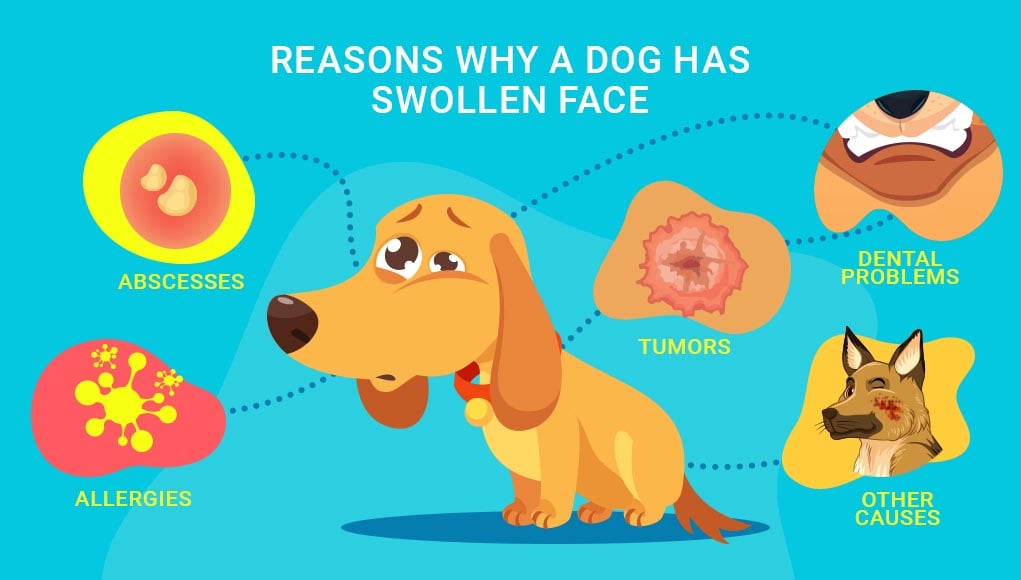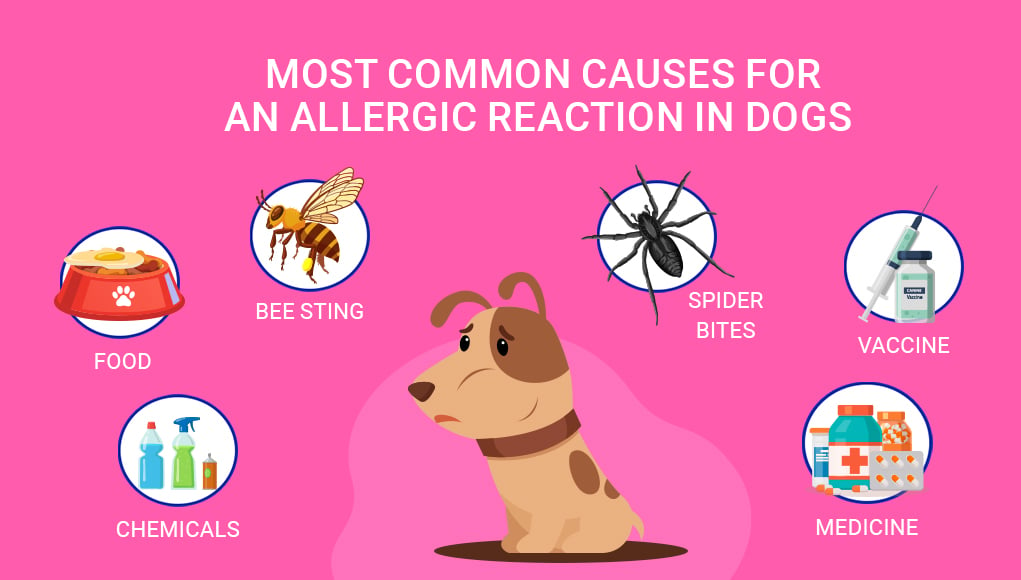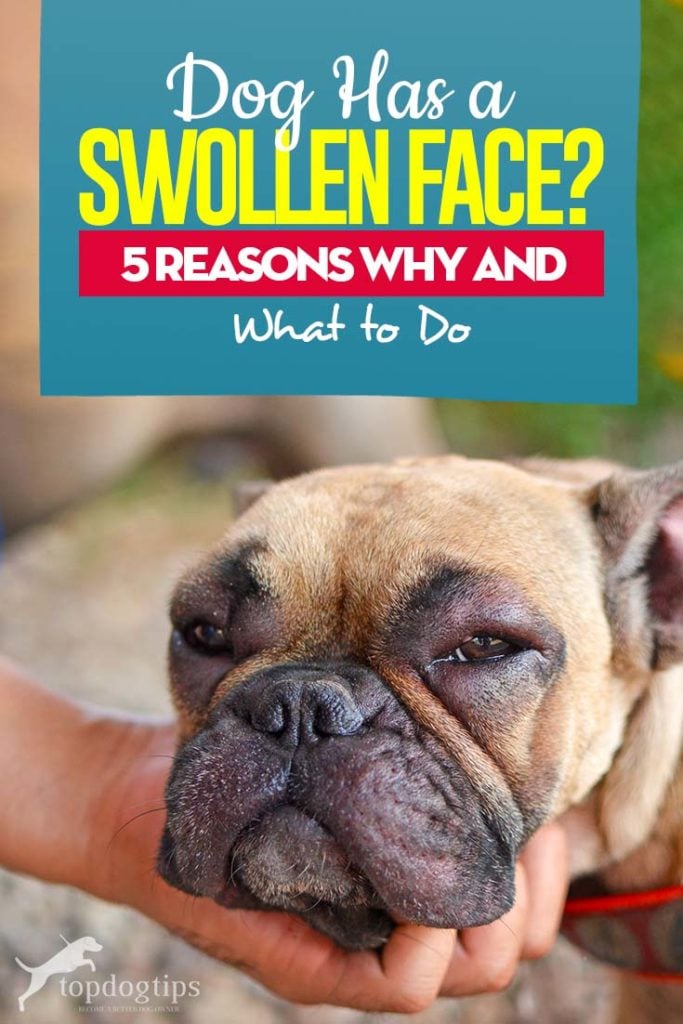
Table of Contents
If your dog has swollen face, there's an underlying cause that you need to determine.
Only then can you know if you should panic or if it's something serious.
And the best way to figure it out? Talk to your vet!
A professional vet should know how to tackle it, stop the swelling, and help your dog recover.
Swelling in a dog's face can have varied causes and meanings behind it: allergies, dental problems, traumatic injuries, and others. (We'll discuss them a bit later.)
One of our resident vet experts, Dr. Myles Rowley, DVM, helped us review and edit this article. We have also featured some advice from Dr. Michele K., DVM of Wag! below.
Here's everything you have to know about a dog's swollen face:
- 7 possible reasons why a dog has swollen face
- Can the swelling be prevented?
- What should you do for your dog's swollen face?
- Other questions pet owners ask about dog's face swelling

7 Reasons Why A Dog Has Swollen Face
1. Allergies
This is one of the more common why a dog would suddenly have a swollen face—allergies.
A severe allergic reaction may lead to a dog's face and throat swelling. If that happens, it can be difficult for our dogs to breathe normally.
If your dog’s throat swells up, their windpipe may be cut off, leading to a change in the color of their gums and potentially your dog passing out.
This might be more common for younger dogs than adults, as pet owners still try to figure out their pup's conditions, including allergy triggers.
You likely won’t know that your dog is allergic to something until they react.
Signs your dog may be having an allergic reaction include:
- Face looks swollen
- Panting or difficulty breathing
- Vomiting
- Purple or blue gums
- Loss of consciousness
Dr. Michele K. DVM, a veterinarian and Wag! expert said that if a puppy's face suddenly swells up, then they may be ‘having a reaction to something, or she may have a problem with her skin.'
“If the problem is still occurring, it would be best to have her seen by a veterinarian as soon as possible. They will be able to see what might be causing the problem and get treatment for her,” Dr. Michele said.
If you see signs of facial swelling, don’t wait to see if it progresses to swelling of the throat—take your dog to the vet immediately.
Your vet will ask questions to help them work out the cause.
It can also be helpful for the vet if you suggest what might have caused the allergic reaction.
Here are the most common causes of an allergic reaction in dogs that you may want to look into:
- Food
- Chemicals
- Bee sting
- Spider bite
- Medication
- Vaccine (this is super rare but still happens for some)
If the vet decides that your dog has had an allergic reaction, treatment options may include an antihistamine, steroids, and sometimes anti-nausea medication.
They may also take skin or blood samples from your pup and, depending on the diagnosis, may recommend a special diet for your dog.

2. Abscesses
If you've ever had an abscess (a.k.a. boil, blister, etc.,) you know it hurts like hell.
When a dog has this on their face, not only that it's very painful for them, but it also causes swelling and inflammation.
It can be from an injury that got infected by a bacteria.
Some tell-tell signs that your dog may have an abscess include:
- Visible pus on an open wound
- Swollen face
- The face or neck appears lopsided
- Fever accompanies the swelling
- Refuses to eat or drink
If this is the case, you should let the experts deal with Fido.
I know they're your fluffy furball and all, but a dog in pain should always be handled with care.
Even when they are normally as sweet as a babe and not aggressive at all, if they are seriously hurting, they are likelier to lash out and bite someone in this state.
An abscess needs immediate veterinary attention.
Your vet should be able to treat your dog with anti-inflammatories and antibiotics. In more serious cases, the abscess may need surgical draining.
3. Dental Problems
Another common cause of swelling of the face in dogs is dental problems.
If your dog has a fractured or infected tooth or untreated gum disease, you'll likely see that part of their face swollen.
Dental problems can also cause painful abscesses in your dog's mouth.
If allergy is more common among younger ones, then dental problems are more common in older dogs.
“Sometimes, in older dogs, a swollen face on one side can be related to a tooth problem, as the roots of their teeth are very large,” said Dr. Michele. “It would be best to have an appointment with her veterinarian to have a look at it.”
“They can give you an idea of what needs to happen as far as treatment goes,” she added.
When you notice that your dog has lost their appetite, it may be too painful for them to eat. Along with a dog's facial swelling, the pain of an abscess may lead to depression, so watch out for changes in your pet's behavior and mood.
Other signs you might see are:
- excessive drooling (may be blood-tinged)
- pawing at the face
- strong odor from the mouth
A vet will perform an oral exam and will likely recommend anesthesia and dental radiographs to diagnose the problem.
Abscessed, mobile, and painful teeth must be removed to solve this problem and prevent future infections.
The vet will likely offer antibiotics and anti-inflammatory medications to help with the pain.
Now, don't worry if your vet has to extract some teeth. Your dog will still be able to eat and will actually feel much better without those diseased teeth!
4. Tumors
Tumors in dogs can be cancerous or non-cancerous, but it is always important to get your dog checked by a vet to eliminate any risk.
If your dog has a tumor in the mouth or the throat, then visible swelling may occur in their face.
Some dogs also have tumors associated with the eye socket, which can cause the eye to have a bulging appearance.
I suggest you take your dog to the vet if you notice the following signs:
- out of the ordinary shape or appearance of the eye or anywhere around the face
- not eating normally
- bleeding
- unpleasant odor
In case it's really a tumor and it turns out to be benign, early treatment is still important.
Tumors occur from the uncontrolled growth of cells and must be removed via surgery or radiotherapy.
5. Traumatic Injury
Dogs are adorable. But some of them are just too clumsy for words.
Any accident that might cause them traumatic injury, like a fall or a fight with another animal, can cause their face to swell up, especially if that's the area where they got hit.
The impact can cause blood vessels to rupture and leak fluid into the surrounding tissues, leading to swelling and inflammation.
This can be a serious condition that will require your vet's prompt attention.
Treatment for swelling in a dog's face will depend on the underlying cause and severity of the condition.
Mild swelling may be treated with rest, ice, and anti-inflammatory medications, while more severe swelling may require drainage or surgical intervention.
Dr. Michele said that in some cases, your vet may also recommend antibiotics and therapy for your dogs.
It's important to follow your veterinarian's instructions for treatment and to monitor your dog's progress closely.
6. Craniomandibular Osteopathy
Craniomandibular Osteopathy is a genetic condition that affects the bones of a dog's skull and jaw.
It is caused by an abnormality in bone growth, which leads to thickening and enlargement of the bones in the skull and jaw.
CMO is most commonly seen in West Highland White Terriers, that's why it is also known as a ‘Westie jaw.' It also typically occurs in dogs between 3 to 10 months.
Some signs you might see include drooling, loss of appetite, and fever.
To diagnose, your vet will most likely do a physical examination, radiographs, and possibly a biopsy of the affected bone.
Because this is hereditary, there is no cure for CMO.
The only thing your vet might recommend is pain management, anti-inflammatory medications, and surgical removal of the affected bone in severe cases.
Don't worry, though; many dogs can live normal, comfortable lives with appropriate treatment and management.
And please, don't breed your dog if they have this condition!
7. Cellulitis
This is a bacterial infection of a dog's skin. This infection can occur anywhere on your dog's body but is most commonly seen in the legs, face, and ears.
Cellulitis is typically caused by bacteria that enter the skin through a wound or other opening, such as a bite, scratch, or surgical incision.
Some of the signs you'll likely notice are:
- redness
- swelling
- warmth
- pain
- discharge from the affected area.
The area may either be tender or firm to the touch.
In severe cases, the infection can spread to other parts of your dog's body and cause fever, lethargy, and loss of appetite.
Apart from the physical examination and skin biopsy, your vet may also have a bacterial culture done on the affected area.
Treatment typically involves antibiotics, as well as pain management and wound care.
If your dog has a severe case, they may be required to stay in the hospital for monitoring and proper supportive care.
Can You Prevent the Swelling on Dog's Face?
There's really no one way to prevent your dog's face from swelling up because the causes are different from one another.
To avoid dental problems, for example, your dog's teeth should be brushed daily. You can also offer them dental chews, water additives, and dry foods instead of wet ones.
You should also avoid letting them anything known that triggers an allergic reaction and keep them away from animals that pose a danger to them.
If they have open wounds from an accident or animal bite, make sure that those are thoroughly cleaned and disinfected, and always monitor your dog for any signs of infection.
What Should You Do For Your Dog's Swollen Face?
Any swelling can turn into severe cases, so your first option and reaction should be taking them to the animal hospital.
Your vet is properly equipped to provide medical advice about your dog's diagnosis and what should be done to treat it.
And if what causes your dog's swollen face isn't visible to the eye, reporting what your dog has been up to hours or days leading to the swelling will be a big help to identify the cause and treatment fast.
Remember: If your dog has swollen face, it should be considered an emergency.
Waiting for it to go away at home without reporting it may lead to a more serious situation that you might regret later on.
What Can I Give My Dog for Swollen Face?
Facial swelling should not be treated at home.
But if you see visible discomfort on your pup, you can try applying a cold compress to the area. That is if they didn't push back.
If your dog welcomed the relief on their inflamed face, keep the cold compress on as you drive them to the vet.
It is very important to see your veterinarian to determine the underlying cause and give the appropriate treatment.
After the diagnosis, you can then ask about the medications to apply or give Fido at home.
Common Questions about Facial Swelling in Dogs
Still want to know more about facial swelling in dogs? Or maybe you prefer a concise version of the above information.
In either case, the following questions should help clear up any lingering doubts.
How Long Does It Take for a Dog's Face Swelling to Go Down?
How long it takes for facial swelling in dogs to go away depends on the cause and how quickly you treat it.
For example, in the case of moderate allergic reactions, you likely won't notice swelling for about 30 minutes or even a few hours after your dog is exposed to the allergen.
If you don't treat the swelling, it could last up to two days (only for allergic reactions.)
Giving your dog the proper treatment, such as an anti-inflammatory or antihistamine medication, will speed up the healing process.
For other causes, the duration will vary.
Can I Give My Dog Benadryl for a Swollen Face?
Yes, Benadryl is safe for dogs. You can use it to treat mild facial swelling from food allergies or itchiness due to skin allergies.
It can also reduce other allergy-related symptoms, including redness, hives, and inflammation.
But it's better if you give Benadryl to dogs after securing your vet's approval.
This medication might be unsafe when given with other meds or for some conditions.
How do you warm compress a dog's swollen face?
Warm compresses can help reduce swelling for chronic inflammation or infection, like in abscesses or cellulitis.
However, if it is due to an acute injury or inflammation, a warm compress may actually make the swelling worse.
So if you're going to use a warm compress, just make sure it's only that—warm.
Using hot water may only burn your dog's skin. And, if they react negatively to the warm compress, stop immediately.
My advice is to check in with your vet first to see which kind of compress may work best for your dog's condition.
Dog Has Swollen Face: Before You Go…
When your dog has swollen face, it is a sure sign to get them to a vet, even if only for your own peace of mind.
When presented with such visible symptoms, it can be easy to attempt a diagnosis yourself.
Still, the most sensible option for the safety and comfort of your pet is to allow a professional to do what they are trained to do.
You can nip serious health issues in the bud early, and you may find that you have avoided a bigger vet bill or, worse, a tragedy for your pet and your family.
So, rush your dog to the vet and share with us in the comments section your experience.
Interested to learn more about managing dog health concerns? Check out our recommended reads below!
Related Articles:
- Tooth Abscess in Dogs: What It is and How to Cure It
- The Vet’s Guide on Shopping for Hypoallergenic Dog Foods
- How to Shrink a Tumor in a Dog
Disclosure: We may earn affiliate commissions at no cost to you from the links on this page. This did not affect our assessment of products.













